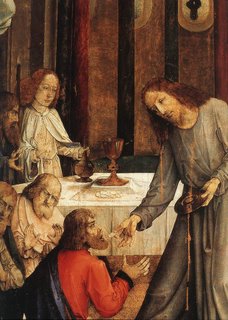
Ever since his provocative article on "The Wars of Religion and the Rise of the State" found its way into my dissertation about ten or so years ago, one of my favourite writers in the tradition of Radical Orthodoxy has been William T. Cavenaugh of St. Thomas University. With Daniel Bell Jr., Cavenaugh is rethinking Liberation Theology for our present context, and like Bell is firmly grounded in the practices of community through work with the base Christian communities in Latin America. Here's a quote from another article which expands on the meaning of Eucharist as central Christian practice in light of globalization:
"... I believe that much of the Christian confusion over globalization results from a neglect of the Eucharist as the source of a truly Catholic practice of space and time. Globalization marks a certain configuration for the discipline of space and time; I would like to juxtapose this geography with another geography, a geography of the Eucharist and its production of catholicity.... I will argue that globalization is not properly characterized by mere fragmentation, but enacts a universal mapping of space typified by detachment from any particular localities. This is not a true catholicity, however, for two reasons: first, this detachment from the particular is actually used as a discipline to reproduce divisions between rich and poor, and second, it produces fragmented subjects unable to engage in a catholic imagination of space and time. [I then show] that the Eucharist produces a catholicity which does not simply prescind from the local, but contains the universal Catholica within each local embodiment.... In the complex space of the body of Christ, attachment to the local is not a fascist nostaligia for gemeinschaft in the face of globalization. Consumption of the Eucharist consumes one into the narrative of the pilgrim City of God, whose reach extends beyond the global to embrace all times and places."
Interested in reading the rest? Go here.
No comments:
Post a Comment